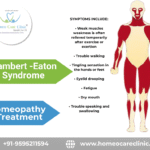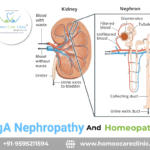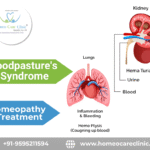What is Goodpasture Syndrome?
Goodpasture Syndrome is a very uncommon but severe autoimmune illness in which the immune system of the body incorrectly forms antibodies to destroy the basement membrane in the lungs and kidneys. It results in pulmonary hemorrhage (bleeding in the lungs) and progressive kidney damage (glomerulonephritis).
The syndrome is also referred to as anti-glomerular basement membrane (anti-GBM) disease. Early diagnosis and quick treatment are crucial to prevent life-threatening damage.
Goodpasture Syndrome Causes
The specific cause of Goodpasture Syndrome is not known, but multiple triggers are thought to play a role:
Possible causes are:
- Genetic predisposition
- Environmental factors: e.g., smoking, hydrocarbon vapors, or viral infections
- Infections: influenza, hepatitis, Epstein-Barr virus
- Exposure to metal dust or solvents
- Certain drugs: e.g., penicillamine
The condition is autoimmune in nature, where antibodies destroy collagen in the lung and kidney tissue, leading to inflammation and damage.
Goodpasture Syndrome Symptoms
Symptoms tend to occur suddenly and advance rapidly, and they typically involve both lungs and kidneys.
Lung symptoms:
- Coughing up blood (hemoptysis)
- Shortness of breath
- Chest pain
- Fatigue
- Fever
Kidney symptoms:
- Blood in the urine (hematuria)
- Leg and ankle swelling (caused by fluid buildup)
- Reduced urine output
- Increased blood pressure
- Protein in urine
- Nausea and vomiting
Goodpasture Syndrome diagnosis
Diagnosis is a combination of:
- Blood tests: to find anti-GBM antibodies
- Urinalysis: for blood/protein content
- Chest X-ray or CT scan: to identify lung bleeding
- Kidney biopsy: establishes inflammation and the presence of antibodies
Goodpasture Syndrome Treatment (Conventional Method)
Traditional goodpasture syndrome treatment is to suppress the immune system and eliminate dangerous antibodies.
Traditional treatment includes:
- Plasmapheresis: to eliminate circulating anti-GBM antibodies
- Corticosteroids: to suppress the immune response and inflammation
- Immunosuppressants (e.g., cyclophosphamide): to avoid repeat antibody production
- Dialysis: for kidney failure
- Kidney transplant: for end-stage renal failure
Though very effective in the short term, these treatments bear severe side effects, including infection, bone marrow suppression, and long-term immune dysfunction.
Homeopathy for Goodpasture Syndrome
At Homeo Care Clinic, with the supervision of Dr. Vaseem Choudhary, a gentle long-term and holistic treatment is undertaken to treat Goodpasture Syndrome naturally and harmlessly.
How Homeopathy Helps:
- Strengthening the body’s internal healing mechanism
- Regulates the immune response
- Slows the progress of the disease
- Improves kidney and lung function
- Lessens the frequency of hospitalisations
- Boosts overall vitality
Can Goodpasture Syndrome Be Cured?
This is a life-threatening disorder, and prompt treatment is crucial. In the conventional approach, there is rarely a complete cure—particularly if extensive kidney damage has already taken place.
Still, with prompt intervention, ongoing monitoring, and homeopathic care, most patients can attain:
- Disease remission
- Slowed disease progression
- Fewer complications
- Enhanced quality of life
Homeopathy aims to regulate the immune system naturally and avoid organ damage, holding out the promise of an improved long-term outlook.
Homeopathic Medicine for Goodpasture Syndrome
Homeopathy aims at regulating the immune system, curing the injured tissues, and enhancing the constitution of the patient. Under the treatment of Dr. Vaseem Choudhary and his skilled team at Homeo Care Clinic, individualized homeopathic regimens have assisted patients in controlling and enhancing Goodpasture Syndrome with negligible side effects.
The following are the most common homeopathic medicines prescribed to treat Goodpasture Syndrome with a thorough explanation of their benefits, how to use them, and when to use them:
-
Arsenicum Album
- Indications:
- Applied in progressive kidney failure with extreme fatigue, restlessness, and worry. The patient can experience burning pain, swelling, and craving for warm liquids.
- Benefits:
- Controls kidney inflammation
- Manages protein loss through urine
- Aids in relieving body swelling and shortness of breath
- Soothes mental tension associated with chronic disease
- When to Use:
- Indicated when the patient complains of progressive weakness, small sips of thirst, anxiety, and swelling secondary to kidney injury.
- How to Use:
- Potency: 6C to 200C according to intensity
- Frequency: Once or twice a day in lower potencies
- Supervision: Most effective under the supervision of a physician for chronic diseases
-
Phosphorus
- Indications:
- Is indicated in those cases where there is dominant bleeding from the lungs, along with hematuria and evidence of renal inflammation.
- Benefits:
- Regulates hemoptysis (spitting up blood)
- Decreases bleeding tendencies
- Aids the healing of lungs and kidneys
- Strengthens immunity and energy
- When to Use:
- Beneficial in patients with recurrent hemorrhages in the lungs, particularly when lying down or exposure to cold air.
- How to Use:
- Potency: 30C to 200C
- Frequency: Daily or on alternate days
- Note: Avoid strong scents, coffee, and raw onions during consumption
-
Kali Carbonicum
- Indications:
- Indicated for chronic nephritis patients, puffiness around the eyes, facial puffiness, and backache due to kidney problems.
- Benefits:
- Decreases puffiness and water retention
- Aids in the repair of kidney tissue
- Regulates blood pressure
- Treats immune-mediated tissue damage
- When to Use:
- Best when there is morning puffiness, lumbar heaviness, and early kidney deterioration.
- How to Use:
- Potency: 30C to 200C
- Frequency: Once a day or as directed
- Recommended: Avoid in acute bleeding; more appropriate for long-term use
-
Mercurius Corrosivus
- Indications:
- Effective in acute nephritis, especially with bloody, burning urination, tenesmus (incomplete urination), and kidney pain.
- Benefits:
- Controls hematuria
- Reduces the inflammation of the glomeruli
- Alleviates burning and straining during urination
- Detoxifies kidney tissue
- When to Use:
- Use in early, acute stages of glomerulonephritis, especially when urination is painful and scanty.
- How to Use:
- Potency: 6C to 30C for acute use
- Frequency: Two to three times a day initially, then taper down
- Monioring: Regularly monitor kidney function tests
-
Terebinthina (Oil of Turpentine)
- Indications:
- Specifically indicated for smoky, dark, or bloody urine, accompanied by pressure or tenderness in the bladder and kidney area.
- Benefits:
- Very good for glomerulonephritis
- Aids in preventing urinary bleeding
- Enhances the flow of urination
- Detoxifies kidneys
- When to Use:
- Indicated when the urine is coffee-colored, smoky, or has a foul odor, and the patient feels dull pain in the kidneys.
- How to Use:
- Potency: 30c
- Frequency: Twice a day at first, taper gradually
- Note: Avoid irritants and nephrotoxic agents during treatment
-
Lycopodium Clavatum
- Indications:
- Used in chronic kidney failure with the symptoms of bloating, gas, poor digestion, and urine retention.
- Benefits:
- Supports gradual, progressive kidney healing
- Improves liver function and overall metabolism
- Lowers uric acid and improves protein metabolism
- Restores the immune system’s overactivity balance
- When to Use:
- Most useful in patients with established kidney damage, sluggish metabolism, and alternate constipation/diarrhea.
- How to Use:
- Potency: 30C to 200C
- Frequency: Daily or alternate days according to the constitution
- Advice: Exclude raw onions and garlic while taking this remedy
Safety and Usage Guidelines
- Self-medication is not recommended in autoimmune kidney diseases such as Goodpasture Syndrome
- Dr. Vaseem Choudhary and his staff at Homeo Care Clinic suggest a thorough constitutional case-taking prior to prescribing
- Dosage and potency depend on patient age, stage of disease, and vitality
- Medicines must be administered on an empty stomach, distant from pungent odors such as camphor or menthol
- Follow-up visits and laboratory tests (such as kidney function tests) must be done regularly during homeopathic treatment
Summary
The function of homeopathic remedies in Goodpasture Syndrome is to control immune reactions, maintain kidney and lung function, and inhibit disease progression. All of the aforementioned remedies are chosen according to an individual’s presentation of symptoms, medical history, and personality characteristics.
Under the expert treatment of Dr. Vaseem Choudhary and his competent staff at Homeo Care Clinic, numerous patients with Goodpasture Syndrome have had remarkable symptomatic improvement, decreased complications, and improved quality of life without harsh side effects.
Benefits of Homeopathy in Goodpasture Syndrome
- Non-invasive and side-effect-free
- Can be taken with conventional medicine
- Assists in slowing the progress of the disease
- Decreases the risk of relapse
- Enhances immunity and quality of life
- Individualised to every patient’s physical, mental, and emotional makeup
Frequently Asked Questions (FAQS)
- What is Goodpasture Syndrome?
Goodpasture Syndrome is a very rare autoimmune disorder in which the immune system incorrectly attacks the kidneys and lungs. It results in lung bleeding and kidney inflammation, resulting in coughing up blood and blood in urine.
- What are the primary Goodpasture Syndrome symptoms?
- Hematuria (urine with blood)
- Proteinuria
- Cough with blood
- Breathlessness
- Leg swelling
- High blood pressure
- Decreased urine output
These goodpasture syndrome symptoms tend to appear abruptly and rapidly progress.
- What is the cause of Goodpasture Syndrome?
The cause is not certain, but potential goodpasture syndrome causes are:
- Autoimmune dysfunction
- Genetic susceptibility (HLA-DR15)
- Infections (viral, bacterial)
- Environmental toxins (smoking, solvents)
- How is Goodpasture Syndrome treated?
Traditional goodpasture syndrome treatment involves:
- Plasmapheresis
- Steroids
- Immunosuppressants
- Dialysis or transplant (in severe kidney failure)
Homeopathy provides a complementary solution, managing the immune system and organ health without side effects.
- Can Goodpasture Syndrome be cured with homeopathy?
Complete recovery is subject to the severity and stage of organ injury, but homeopathy can assist in:
- Slowing down the disease process
- Treating symptoms safely
- Boosting immunity
- Improving energy levels and diminishing hospital dependence
Under Dr. Vaseem Choudhary’s supervision, a vast majority of Goodpasture Syndrome patients at Homeo Care Clinic have reported considerable improvements in lung and kidney functioning under individualized homeopathic treatment.
- Which is the best homeopathic clinic for Goodpasture Syndrome?
Homeo Care Clinic under the able hand of Dr. Vaseem Choudhary and his experienced team has earned fame by treating uncommon autoimmune conditions such as Goodpasture Syndrome using individualized homeopathic protocols with better patient outcomes.
Lifestyle & Diet Tips
- Stay hydrated: Maintains flushing off toxins and offloads kidney work
- Low-salt diet: For blood pressure control
- Restrict red meat and high-protein foods in case of decreased kidney function
- Quit smoking: Avoids lung complications
- Breathing exercises light to build up lung capacity
- Regular follow-up: Monitoring is a must
Final Thoughts
Goodpasture Syndrome, although rare and virulent, can be effectively treated with proper care. Homeopathy provides a soft yet effective solution by acting on the immune system and aiding organ recovery.
Under the care of Dr. Vaseem Choudhary and the staff at Homeo Care Clinic, patients can enjoy long-term relief, improved health results, and enhanced quality of life.
If you’re in search of bullous pemphigoid treatment in India, contact Dr. Vaseem Choudhary and his team of specialists at Homeo Care Clinic, Pune, where science is bridled with compassion in healing.
To schedule an appointment or learn more about our treatment, please visit our website or give us a call +91 9595211594 O. ur friendly staff will be happy to assist you. If you’re searching for the best homeopathy doctor, we are here to help.
Follow us on Facebook, Twitter, and Instagram for valuable insights into the world of homeopathy and holistic health.
Facebook – https://www.facebook.com/homeocareclinicpune
Instagram – https://www.instagram.com/homeocareclinic_in
Website – https://www.homeocareclinic.in
Chat with the best homeopathic doctor privately
If you have any queries regarding your disease or any symptoms, Click to send a WhatsApp message. Our best homeopathy doctor will be happy to answer you.
Book an Appointment
If you want to visit our clinic, Click to book an appointment.
Online treatment
If you are a busy professional, or you are living in a remote town or city, with no best homeopathic doctor near you, Clickhere to start an online homeopathic treatment with the world’s exclusive, most experienced and best homeopathic clinic, managed by Dr. Vaseem Choudhary world-renowned homeopathic doctor expert.






